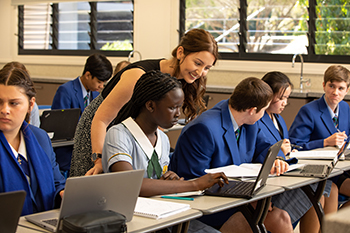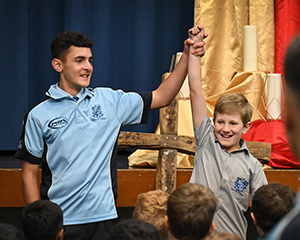
Each young person is gifted and called by God and our role as educators is to help these gifts emerge and bear fruit. Catholics believe the conferring of charism takes place at Baptism, Confirmation and in other moments of our Christian life.
As the Catechism of the Catholic Church says, “by the Sacrament of Confirmation, [the baptised] are more perfectly bound to the Church and are enriched with a special strength of the Holy Spirit. Hence, they are, as true witnesses of Christ, more strictly obliged to spread and defend the faith by word and deed” ( #1285).
Michelangelo believed that the sculptor was a tool of God and it was his or her job to help cooperate with God in releasing the beauty within each piece of marble. Likewise, the student is not passive in the experience of formation, as they begin to discover their calling and how his or her gifts can be shared in the service of others. As educators, we support young people to be who God created them to be so they will set the world on fire. These words, attributed to St Catherine of Siena, express a desire to live our calling and giftedness in response to being known and loved by God.
In his book Outliers, Malcolm Gladwell claims that 10,000 hours of dedicated practice is sufficient to master skills as a musician, artist, pilot or carpenter. Unlike skills that can be taught and perfected, charismatic gifts must be discerned and nurtured. We are not creating “masters” of the faith. We help our students discern their charisms and begin to nurture them in the first steps of a lifelong journey of formation.
 Marist schools are part of a spiritual family that began through the charism of St Marcellin Champagnat. This spiritual tradition continues to help young people encounter Jesus and express their own gifts of the Spirit through the Marist spirituality. Our schools are centres of the new evangelisation, where Jesus is encountered, known and loved, in the way of Mary. We follow Pope Francis’ call to a Marian style of evangelisation that “proposes with tender mercy Christ among us and holding the world close, especially to those on the peripheries. It avoids all politicisations and polarisations, as these impose themselves on the Church and in the world” (Evangelisation, ACBC).
Marist schools are part of a spiritual family that began through the charism of St Marcellin Champagnat. This spiritual tradition continues to help young people encounter Jesus and express their own gifts of the Spirit through the Marist spirituality. Our schools are centres of the new evangelisation, where Jesus is encountered, known and loved, in the way of Mary. We follow Pope Francis’ call to a Marian style of evangelisation that “proposes with tender mercy Christ among us and holding the world close, especially to those on the peripheries. It avoids all politicisations and polarisations, as these impose themselves on the Church and in the world” (Evangelisation, ACBC).
A great deal of preparation is afforded to the Sacrament of Confirmation, but an equal and more permanent engagement with young people is required in the following years of high school. Schools like Marist College Canberra invite students to continue their formation through religious education and opportunities to affirm their giftedness in the service of others.
Groups like Marist Game Changers create an environment to explore spiritual gifts through engaging activities and reflections that are sequenced and sustained. These groups are supported by retreat days and senior students are invited into mentoring programs for individual accompaniment. Count Your Blessings is a specific retreat day for year 10s to explore their personal gifts and to begin to recognise these in others. Parish youth groups and national events such as Ignite Conference complement the school experience of peer-to-peer youth ministry.
Providing pathways for leadership, activation of gifts and the empowerment of young people is a critical aspect of Catholic education. Young people are attracted to Christians who are living out their vocational call; they notice the transformation of their peers and desire to be involved. The declining numbers of church attendance and religious belief can be disheartening, but we are called to live with hope, to read the signs of the times and to see God “doing a new thing” with young people (Isaiah 43:19).
God continues to do new things in schools and His graces are being poured into our lap, pressed down and overflowing (Luke 6:38). You only need to look at the life and vitality of the Catholic Schools Youth Ministry International (CSYMI), Youth Alpha, Marist Youth Ministry, National Evangelisation Team and recent graduates volunteering in mission and solidarity. In addition to these bright and shiny witnesses, there are many hidden and unknown expressions and manifestations of the Holy Spirit in the lives of young people, which take years to emerge.
In Matthew 7:16, Jesus reminds us that we “will know them by their fruit” and what a joy it is to watch young people change the world through their supernatural expressions of enthusiasm, generosity and generativity. Educators and parents also have the responsibility to prepare young people to discern and value their gifts for the service of the world, which is more valuable than guidance on navigating a successful career of wealth and comfort.
It’s important to remember that the school experience is just the beginning. There is much more to do post-school and with far fewer resources, especially for young people who are not directly involved in youth ministry training or formation. Activating parish programs like the Catherine of Siena Institute’s Called and Gifted program and young adult accompaniment capitalises on the work of schools and draws young people into full, active and conscious participation in the Church and the world.
 Nathan Ahearne has been involved in the faith formation of young people for more than 20 years and currently works for the Marist Mission and Life Formation Team in adult faith formation. His wife and children are his greatest joy and blessing. Nathan describes himself as a John 10:10 person who aims to live life to the full each day through prayer, contemplation and service.
Nathan Ahearne has been involved in the faith formation of young people for more than 20 years and currently works for the Marist Mission and Life Formation Team in adult faith formation. His wife and children are his greatest joy and blessing. Nathan describes himself as a John 10:10 person who aims to live life to the full each day through prayer, contemplation and service.
Images: Supplied
Words: Nathan Ahearne



